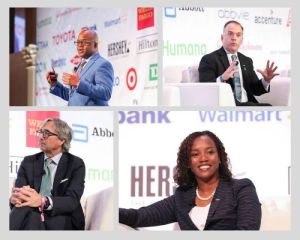It was early in Leah Goodridge’s career when she witnessed colorism in the workplace.
Two Black candidates were being evaluated for a position. One was dark-skinned and had more experience, while the other was light-skinned. Goodridge, an intern at the time, recalls overhearing explicit conversations. The company didn’t want a darker-skinned person to be the “face” of the institution.
“Because my antennas were raised, I wondered, how might this play out when the conversation isn’t explicit? When there are coded conversations? Later, people use words like ‘polished’ and ‘well put together.’ They would often be applied to a candidate who was Black or another person of color with very light skin,” she says.

















